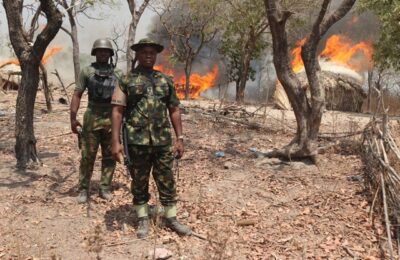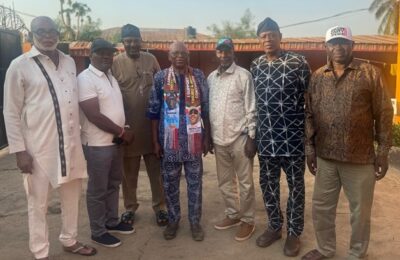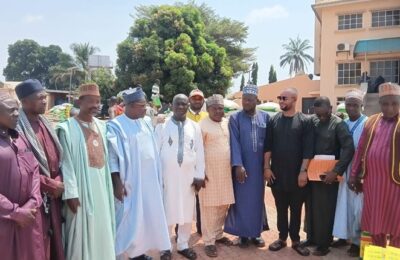First, we thank God for the seeming peace in the land; for restrained bloodletting on account of 2015 elections and for the shimmering hope of a redeemed international image. Nigeria need understand that her future depends not on chance, but on choices made at each turn. According to Acemoglu & Robinson in “Why Nations Fail”, those seeming little, inconsequential, decisions do all add up; for the better or for the worse. The Nigeria of today is the result of choices made in the past.
Today, Nigeria weaves along treacherous paths to nationhood. Only time will tell, perhaps in a century or after, whether the paths trodden were virtuous enough to permit inclusiveness in political and economic institutions, or she is further enslaved in a vicious circle of extractive political and economic institutions to the wellness of a few elites and to the impoverishment of the majority; or whether in fact she ceases to exist as we know now.
We all do seek a glorious Nigeria but differ greatly on how to bring this about. So many contending issues before us, but if we borrow from Steven Covey’s “7 Habits of Highly Effective People” we might choose those fundamentals that builds a positive and successful society. Some thoughts on a few of them.
- Education
Education is too critical to be left to the vagaries and vagueness of executives cum politicians who are more interested in contracts than in the sound nurturing and culturing of tomorrows minds. The incoming generation is atrophying right before our very eyes! What use for a society that fails to raise a better generation after itself? That society self-extincts, but first is savagery, then slavery. This appeal is to us all, those in Government, Teachers, Parents and Traditional institutions.
I heard Prof. Osinbajo, Vice President elect, say on education “there will be complete restructuring of the sector to include 21st century workplace skills; revised curriculum to highlight critical thinking, innovation and numeracy skills; science and technology development and teacher training.” May we include, among others, streamlining and standardization of Secondary School administration, abolishment of discriminatory and archaic policies and introduction of African / Nigerian history in our curriculum. Two examples:
- Discriminatory policies in Education: e.g. “Educationally Disadvantaged States” – Adamawa, Bauchi, Bayelsa, Benue, Borno, Cross River, Ebonyi, Gombe, Jigawa, Kaduna, Kano, Kastina, Kebbi, Kogi, Kwara, Nasarawa, Niger, Plateau, Rivers, Sokoto, Taraba, Yobe, and Zamfara States are listed. Policies on education ought to be standardized and uniform across the country. This particular policy has outlived its times, it is at variance with a unified country, it removes incentive for rigorous academic excellence, it Introduces negative psychological profiling and segregation; it perpetually adds a drag to our development; besides the fact that it has not proven to be of any benefit.
- Streamlining of Education Administration and Quality of delivery: Got a shocker recently at a community meeting. Schools of renown have become mere skeletons. The best secondary school in that area has got 7 teachers, inclusive of Principal, Vice-Principal; they teach about 36 subjects to over 400 students from JSS1 through SSS3. Am told the school is among the lucky few, as there are several others with only one or two teacher; and double as Principal, Vice Principal, Games master, every every. Interestingly, some schools in this same area, under an administration called SUBEB (State Universal basic Education Board), have 4:6 teacher to student ratio. There are over 20 secondary schools in the area, all under different administrations: SUBEB, STTEB (Science Technical and Technology Education Board), TSC (Teaching Service Commission), LGSS (Local Government Secondary School), etc; hence varying standards or number of teachers. Why so many different administrations just for secondary education?
What goes on currently is beyond reasoning! Communities now contribute towards “Miracle Centres” because there is no other way to guarantee that students would pass SSCE and JAMB exams. I refuse to contemplate the future of these young lads. The social media is already awash with half-bakes who barely can make a sentence yet the society expects them to comprehend economic, political or developmental issues?
- Electoral Process: Under-aged Voting
The pervasive culture of under-age voting, particularly in northern parts of the country, leaves much to be desired. This anomaly was witnessed again, large scale, during the last elections and we all seem intimidated into silence! High time we understand that political victory via undercuts can only serve parochial interests; never the interest of the people!
The stance of the electoral umpire, INEC, and security operatives to close eyes to under-age voter registration, under-age voter accreditation and under-age balloting is not healthy for our democratic process, except we delude ourselves. Voting age by law in Nigeria is 18 years and it simply cannot be right to accommodate 8 to 17year olds and say it doesn’t matter, it hell does!
This must stop before the next elections; else we will see intense mobilization across other parts of the country for 8yrs and above to also register, obtain voters cards and to vote. Then, nobody should shout o! What is good for the goose is also good for the gander. Where then will it lead us?
- Electoral Process: Internal Democracy
Democracy without Internal democracy is like curing ringworm at the expence of leprosy. We claim democracy but despise democratic norms. Our manner of democracy with no intra-party democracy, leads only one way, downhill. We encourage the Machiavellian culture of “the end justifies the means” – may the best rigger can win.
Whatever victory is won by wrongful means remain only Pyrrhic victory; negating the future we strive for and takes us no further than to butter the bread of a few cabals who see political power as the most lucrative venture, hence it’s do or die. Typical example from my Senatorial District at the just concluded elections.
The current Senator elect of the APC eloped with primaries élection materials of his party and wrote himself results to be nominated as the party’s candidate in active connivance of party bigwigs. While other contestants and party faithfuls waited in vain at the supposed venue of party primaries, results of the primaries were being announced on the media by the party machinery. As fate would have it, the “Buhari CHANGE” tsunami swept in APC at the elections and the fraudster now stands a Senator elect of the Federal Republic! Fait accompli.
Similarly, the incumbent Senator, now outgoing, of the erstwhile ruling party PDP, in order to “secure” a third term nomination at the primaries went against collectively agreed principles of inclusiveness and rotation, rode on a few money bags, perceived closeness to C-in-C and his money to “successfully” hijack his party delegates with dividends of democracy (SUVs, cars, money and intimidation). With the nomination in hand, he disparaged and insulted all who dared to say raca! Unfortunately, he was sailing against the wind this time, hence he lost.
What is shocking is that to the electorate and political participants, this is not new. In fact it is the norm and they look forward to whom out-smarts the other at each election. This is the typical scenario across the nation be it Presidential, Federal / State Legislatives, Gubernatorial or Local Government Council elections. Little wonder we keep be going round the same vicious circle that got us where we are today! Doing the same things and asking for a different result? Madness!
- Electoral Process: Card Readers, PVC and Incidence Forms things
2015 elections is already won and lost. INEC made some progress in the overall electioneering process, but, it is not yet uhuru! We must be circumspect enough to interrogate the new introductions into our lexicons and national consciousness, I mean Card Readers, PVCs – Permanent Voters Card and Incident Forms.
For reasons of sensitivity, one refuses at the moment, to raise such issues as
- Whether or not the Card Readers did in fact uniquely identify each voter?
- Whether or not it is ethical to have two different accreditation procedures for an election? Whether the two procedures adopted in 2015 elections impacted the elections and by how much? These two different procedures were:
- PVC + Card Reader + or – Incidence Forms and
2 PVC + Electoral Register – Incidence Forms
We must challenge INEC and other independent observers to post-mortem the last elections and make public their findings. We should be interested in the statistics, demographics and characteristics of the 2015 elections. It is necessary that we be vigilant, less we fall victims of history by our short sightedness and intellectual laziness.
- Unique Identification of every citizen
Nigeria has always shied away from pursuing any course which would ultimately result in the unique identification of her people. Critical national exercises like the Census, National Identity Card programs, Electoral processes, etc. have become major means of exploitation of our common wealth. Currently, some people have National ID Cards and most do not have; some have more than one PVC, some have none, some are even not registered voters but can be hired to vote; et ce tera.
All these critical national progammes are enmeshed in controversies, compromises, political interventions and inconsistencies; all in an attempt by some interests not to lose some perceived advantages. We cannot continue weaving about as a nation based on assumptions. Our policies and planning must be based on facts grounded on verifiable statistics.
To do these things is not rocket science, the major hindrance had always been our political institutions. We can only continue to ignore this at the peril of our collective existence as a nation. A unique identification for each citizen serves as a check, and is tied to every social or developmental programmes, be it security, credit/banking system, employment, elections, health, name it. Little wonder it remains for us the road not taken, because it will check our excesses and block institutional loopholes.
- Divergence of economy (government revenue) from oil and sustainability of current State structure
It is clear that current configuration of the Nigerian economy particularly as regards the oil sector is no longer sustainable. This issue is so widely discussed that no more need be said.
The opinion here is that Federal might be brought to bear in seeking alternatives to oil revenue. Just as was done the oil industry, the Federal Government must take the leading role in facilitating feasibility, exploration, governance and reward from identified natural resource in a strategic manner, as national assets. Only the Federal Government can create the enabling environment to fully harness these resources. The States, maybe with the exception Lagos, Rivers and Akwa Ibom, simply do not have the capacity required to exploit these resources at the level required for sustained benefit. If they did, they would have done so before now.
Many have opined that economic viability be the measure for State existence, some agitate for additional States and others prefer to be hived off their current State and included in another. The point is that people must learn how to live together in equity, fairness and love. However, if this were possible, would the world not be at peace?
Some Governors and Chairmen of Councils now wish they never contested elections in the first place, with increasingly difficulties to meet wage obligations let alone executing developmental ideas. Some that honestly wish to perform have found themselves completely incapacitated and in the process have lost goodwill and lost face due to the vicious nature of our polity. Herein lies their dilemma, the buck always stops at a table.
Thank you.
Gbenga Ezekiel
0706 874 8980




